|
Back to the Press Releases Main Page
KWIK SAVE GROUP PLC 1997 INTERIM RESULTSThe following press release was issued today by Dairy Farm's associate, Kwik Save Group plc.
For more information, please contact:
From 9:00 p.m. on 8th May 1997 (Hong Kong time), the full text of the interim results for
the 28 weeks ended 15th March 1997 can be accessed through the internet at "http://www.irasia.com/listco/sg/dairyfarm" and is also available through "First Call".
Kwik Save Group plc ("Kwik Save") Kwik Save, the UK's leading discount food retailer, today announces interim results for the 28 weeks ended 15 March 1997.
Chief Executive Graeme Bowler said "Kwik Save is 6 months into a three year programme for change and we are making good progress. We have done the things we said we would do when we announced our New Generation strategy at the time of our preliminary results announcement last November. We knew that our chosen strategy would be challenging and trading conditions remain extremely competitive. Nevertheless, the core of our retail philosophy - the provision to customers of quality products at discount prices from accessible stores - remains as valid as ever. We are in the early stages of a programme of change which is large and complex. It will reach into all aspects of our customer offer, business processes and operating culture. Encouraging progress has been made and our determination to achieve steady and successful transformation remains absolute." Further enquiries :
Kwik Save Group Plc In the first 28 weeks of our trading year profits before tax and exceptional items were up by 1.4%. From these profits we have deducted £4.1 million of exceptional re-organisation costs. Sales were £1.81 billion, down 1.4% on the comparable period in the previous year. The interim dividend remains unchanged from last year at 5.95p. This will be payable on 7 July 1997 to shareholders on the register at 2 June 1997. New Generation Kwik Save Last November we launched New Generation Kwik Save, a programme of significant and irreversible change within our business. The key elements are :
We are six months into our three year programme. We are on schedule and encouraged by the progress made so far. Kwik Save Brand - You won't spot better for less On the 28 April 1997 we announced the official launch of 152 Kwik Save brand products, supported by a high profile in-store marketing campaign. The Kwik Save brand offers our customers top quality, equivalent to or better than comparable own label or nationally branded products - at lower prices. We have given a "No Question Guarantee" on every single Kwik Save brand product. This backs up our commitment to quality by the promise of a full refund without question to any customer who is not completely satisfied with product quality. Kwik Save will continue to offer national brands at discounted prices - this is our heritage. In time, our objective is to extend the range of Kwik Save brand products so that it accounts for up to 20% of our total sales. This would mean that the Kwik Save and "No Frills" brands together would account for around 30% of total sales. We plan the introduction of a further 150 new Kwik Save brand products later in the year, building up to a total of 1,000 products over the course of the programme. Developing Modern Ranges We are conducting an overhaul of our product ranges in order to improve their customer appeal. As part of this, we are introducing new and improved products within growing categories such as chilled and convenience foods, health and beauty aids. To create space, we will be delisting lines in mature and declining categories. Our aim is to have completed the first full range review by the end of the year and we will make range modernisation a process of continuous improvement thereafter. Fresh Food In our larger stores, we have been working closely with concessionaires to broaden their product range and to ensure consistent value and quality throughout the chain. In future, as part of the roll-out of the New Generation concept, we will have the fresh fruit and vegetable offer first in flow. The meat and delicatessen offer will also be featured prominently within the natural customer traffic flow in-store. Early indications of customer satisfaction from the stores at which changes have been piloted are positive. In our smaller stores where there is no concession offer, we are now introducing a range of pre-packed fruit and vegetables and prepared salads. The roll-out process is firmly underway with the objective of introducing the new pre-packed offer at the rate of 20 to 30 smaller stores per month. We will complete this project within 12 months. Store Closures Last November, we announced a plan to close 107 stores during this financial year. We expect to meet our full year closure objectives and 50 of the 107 stores have already been closed. The disposal programme is also proceeding in accordance with our original expectations. Of the 50 stores closed to date, 27 have either been sold or are subject to contract. In addition, we have disposed of 40 properties which had already been closed prior to last year-end. New Generation Store We opened the first New Generation Kwik Save store at Northwich, Cheshire on 22 April 1997. This store incorporates all elements of the improved customer offer. We intend to use it as a learning platform from which we will develop a further four full concept trial stores by the end of September. Once we have fully tested, reviewed and defined our New Generation concept we will introduce it in geographical clusters over a period of five years. We will be making clear improvements to the customer offer within our existing store base in parallel with the roll-out of the full New Generation offer, in the form of :-
Each of these initiatives is designed to deliver benefits in the short term, upon which we will build to provide lasting benefits over the longer term. We look forward with increasing optimism to building on the momentum for change achieved thus far. People We have taken decisive steps towards building a more customer-focused culture. Extensive organisational restructuring has taken place in areas such as retail operations, information technology, human resources, buying and marketing. We have begun to implement new induction and training methods, developed better internal communication processes and introduced measures to improve staff retention rates. We have appointed Juris Grinbergs as Human Resources Director. Juris joins us from Grand Metropolitan plc, where he was Director of Human Resources with GrandMet Foods. Board Changes Sir Timothy Harford, the Deputy Chairman, will be retiring from the Board on 31 August 1997 having completed over 24 years as a Non-executive Director. John Murphy retired as an Executive Director in January 1997 having been a member of the Board for the last ten years, including three years as Deputy Managing Director. Ron Fulford joined the Board as Non-executive Director on 6 May 1997. Mr Fulford served in a range of executive positions within Hanson PLC including eight years as Chairman of Imperial Tobacco until 1996. He is currently Chief Executive of Liggett Group Inc., a subsidiary of Brooke Group Ltd.. Financial Review Like-for-like sales by value declined by 1.6% during the first half year excluding those 107 stores either closed, or due to be closed as part of the previously announced store rationalisation programme. Of these 107 stores due to close, 82 were still trading at the end of the half year, with a further 25 having closed subsequently. As anticipated, they experienced a significant fall in sales following the closure announcements last November, the impact of which was a reduction in sales of 0.8% on the overall sales performance of the company. Two new stores, which were committed to before the announcement of the New Generation strategy, were opened during the period. Sales in these stores, and the other stores opened in the last twelve months contributed 2.0% to overall sales performance. Closures during the period reduced overall sales by 1.0%. Underlying gross margins were up by 0.9% reflecting general industry trends, easing of pricing pressures on basic commodity items and improved margin mix. At the same time, initiatives to tighten control over shrinkage and wastage provided a further benefit of 0.2% to the margin. Distribution costs were up by 4% (0.1% of sales) reflecting the cost of implementing the final phase of composite development at the new Wellingborough depot, last Autumn. However, productivity has been improving steadily in recent periods and distribution costs are now running below last year's levels. Overall reported gross margin was up by 1%. Store and central overhead costs rose by 6% (0.9% of sales). Within this increase, store wages rose by 0.3% of sales influenced by the maintenance and improvement of service and standards against a backdrop of a slowdown in sales. Other store overheads including occupancy also rose by 0.3% of sales. Central costs showed a similar increase and were influenced by the build-up of resources to support the New Generation programme, in particular computer systems development. Exceptional re-organisation costs were £4.1 million (0.2% of sales). Concession and tenant rental income, together with National Lottery commission was up by 6%. Our assessment at this stage of the 107 store closure and disposal programme, is that it is adequately provided for. The half year profits do not contain any write-back of unutilised provisions. Capital Expenditure and Funding There has been a significant reduction in the level of capital expenditure in the first half compared to the same period of the previous year. This reflects the fact that our focus has been on the development and trialling of initiatives to support the New Generation programme. Capital expenditure in the period was £6.5 million (1995/96 £68.6 million). Future investment will concentrate on the existing store base and full year capital spending is forecast at about £35 million for 1996/97. We plan to more than double this level of capital investment next year as we begin to roll-out our new concept into existing stores. Average borrowings in the first half were £120 million (1995/96 £75 million). Part of the rise in average borrowings is due to the payment of £39 million in corporation tax paid in the second half of last year, which had been deferred from the previous year. Furthermore, we invested a greater amount in pre-budget stock purchases in anticipation of duty increases in the first half of 1996/97 than in the comparable period of the prior year. Net interest costs were £4.1 million (1995/96 £2.7 million). Current Trading and Prospects In the first seven weeks since the half year end, like-for-like sales in continuing stores were down by 6% and selling price inflation was negligible. The increase in underlying gross margins during the first half continued into the current trading period and has offset the effect of lower sales. We are now well into the New Generation programme and will proceed on a broad front in the second half of the year including :
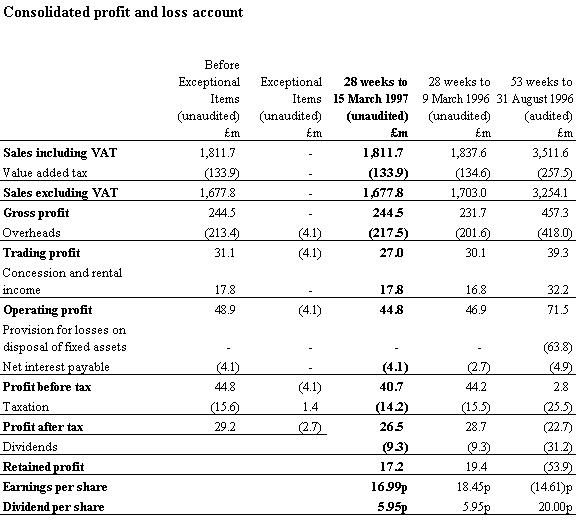 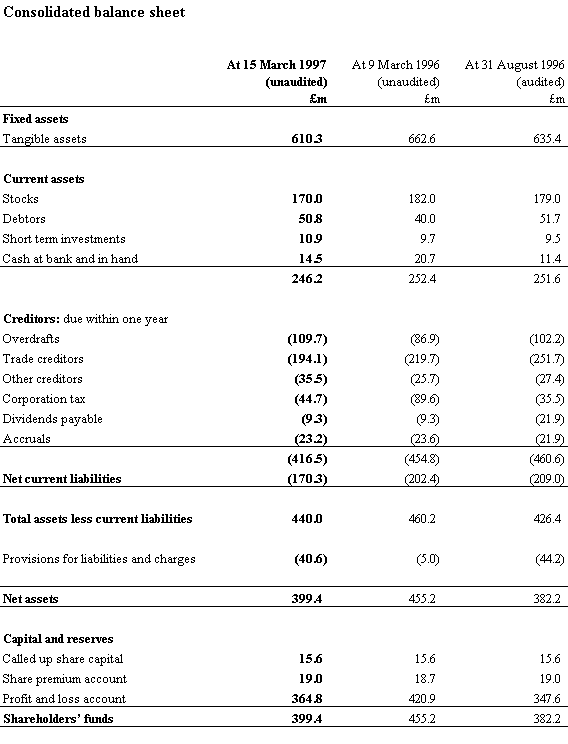 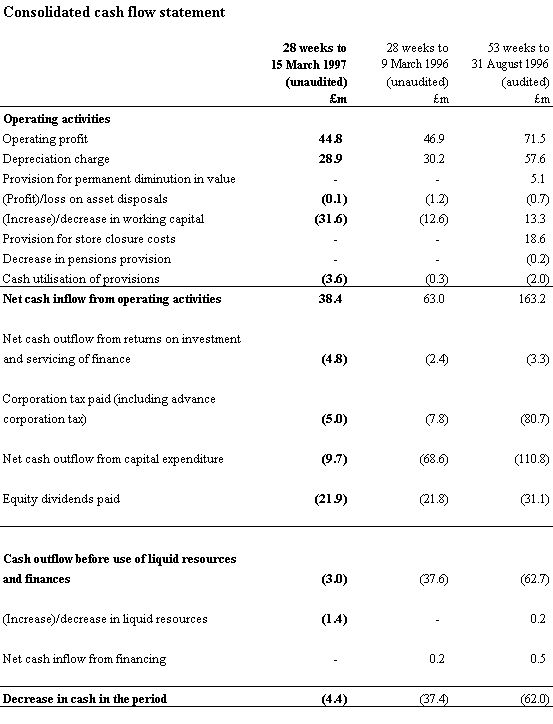 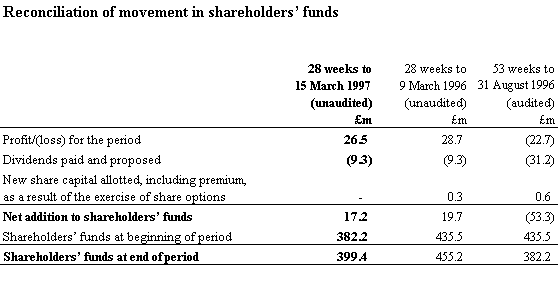 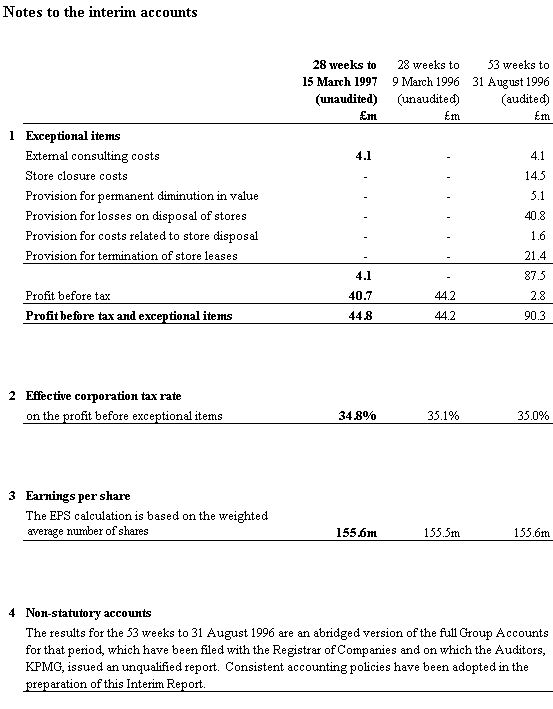 |